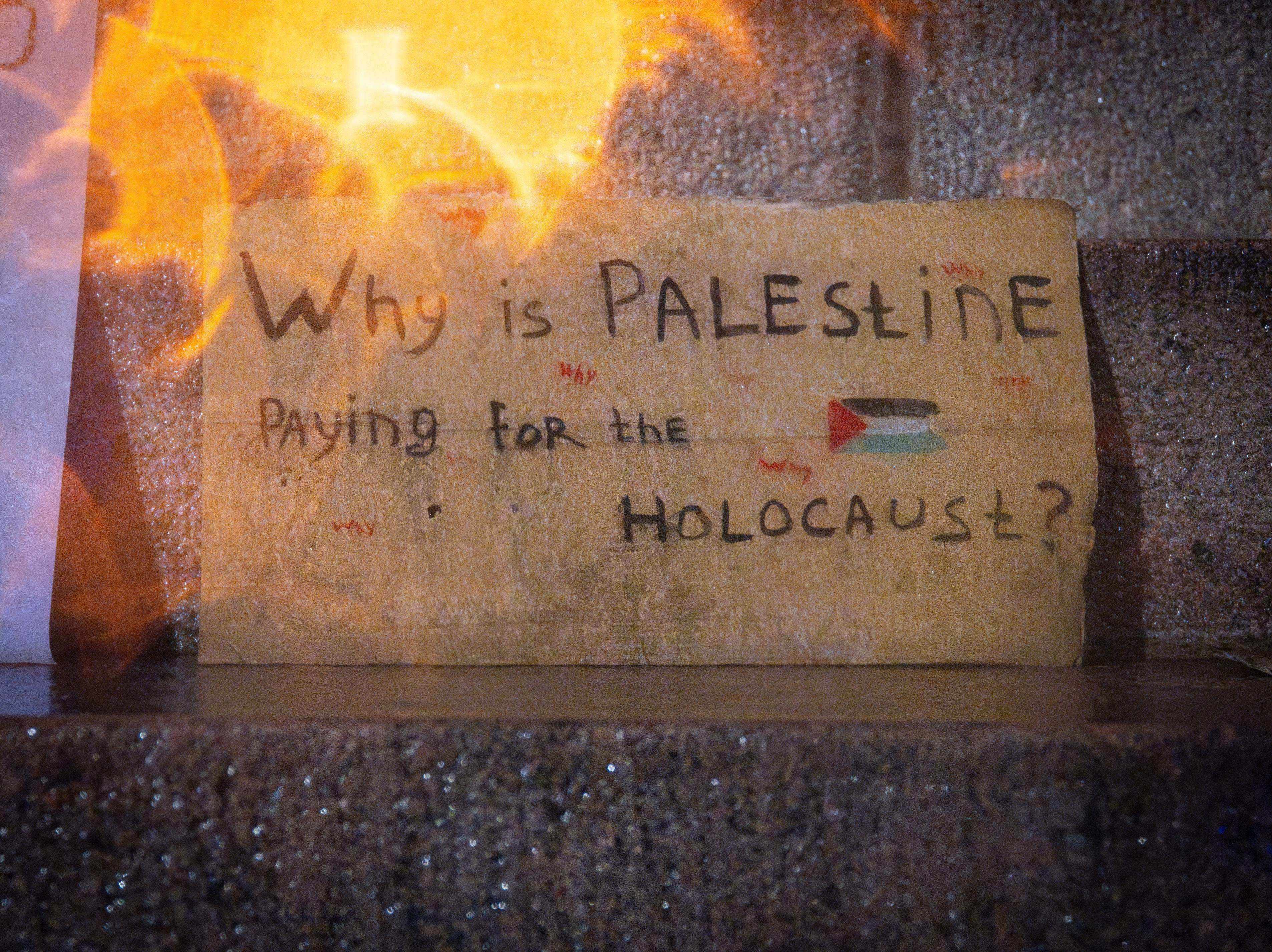يقول الصحفي والروائي البريطاني جورج أوريل:"من يتحّكم في الماضي، يتحكّم في المستقبل، ومن يتحكّم في الحاضر، يتحكّم في الماضي".
تشكّل معركة الرواية جزءا هامّا من معركة الرأي العام العالمي عن فلسطين في الحرب التي يشنّها الاحتلال الإسرائيلي على غزة. ولكي نكون أكثر إنصافا للشهداء – وبتوظيف لغة القانون الدولي - علينا أن نكون أكثر دقّة في التوصيف، حيث إن الإبادة الجماعية المتعمّدة هي التوصيف الذي يمكن أن نعنون به هذه الحرب.
فالكيان الإسرائيلي، ومنذ ما قبل قيامه رسميّا من خلال احتلال فلسطين في عام 1948، أتقن صياغة الرواية التي تجيز له ليس فقط احتلال أرض عربية كفلسطين، بل أيضا شرعنة كلّ الجرائم التي ارتكبها وما يزال حتى اللحظة ضد الفلسطينيين.
في السنوات القليلة الماضية، دأب العلماء والمؤرّخون الإسرائيليون في إعادة تسليط الضوء في كتاباتهم على أهمية الرواية الإسرائيلية كسلاح لتثبيت قوّتهم وسلطتهم حول العالم بسبب ما رصدوه "من اهتمام عدد من الدول الغربية وتحديدا في الولايات المتحدة الأميركية وفرنسا وبريطانيا وألمانيا حول معرفة ماذا حصل في الماضي لليهود"(1) بدءا من الهولوكوست ووصولا إلى "حقّهم الموعود" كما يدّعون في أرض فلسطين أو "أرض الميعاد" كما يسمّونها.
وتعدّ الذاكرة الجماعية في الصهيونية حاجة مهمّة في فهم ودراسة ليس فقط التاريخ الإسرائيلي، بل أيضا المجتمع والسياسة على مرّ السنين؛ فبالنسبة إليهم يعتمد استشراف أو بناء المستقبل على كيفية صياغة الماضي المرتبط بمفاهيم متجذّرة في الذاكرة الجماعية الإسرائيلية مثل التضحية والبطولة.
ومن أجل استمرارية قوة وسلطة الرواية الإسرائيلية في العالم، يقوم الإسرائيليون بشكل دائم بإعادة بنائها وصياغتها داخل المجتمع الإسرائيلي نفسه؛ فالقائمون على الصهيونية يعتبرون أنه "للحفاظ على سلطة روايتهم يجب عليهم إعادة بنائها وحفظها وإعادة إنتاجها باستمرار"(2) داخليا ومنها ينطلقون إلى الجبهة الخارجية لتثبيت شرعية جرائمه.
دأب العلماء والمؤرّخون الإسرائيليون على تسليط الضوء بأهمية الرواية الإسرائيلية كسلاح لتثبيت قوّتهم وسلطتهم بسبب ما رصدوه "من اهتمام عدد من الدول الغربية وتحديدا في الولايات المتحدة الأمريكية، وفرنسا، وبريطانيا وألمانيا حول معرفة ماذا حصل في الماضي لليهود.
وفي البحث عن تاريخ تطوّر الرواية الإسرائيلية وكيفية استغلالها لدى الرأي العام العالمي، يتوضّح هذا الربط اللافت بين الجبهتين الداخلية والخارجية، الأولى لصالح المسألة الوجودية الصهيونية وتثبيت "المواطنين الإسرائيليين في أرض الميعاد" والثانية لأجل الاستقطاب الخارجي العالمي السياسي والاقتصادي الاستعماريين. وعلى الرغم من قوة الرواية الإسرائيلية وسلطتها، إلا أن بعض المؤرخين الإسرائيليين بدؤوا منذ سنوات بالتحدث عن "بداية دخول الشكّ عند بعض فئات المجتمع، بعدما كانت مسألة وجودية غير قابلة للنقاش"(3).
بين المصير والتشكيك
تقوم الرواية والعقيدة الإسرائيليتين على الاعتقاد بأن "الله دعا المتطوّعين للخدمة في إسرائيل". وبالنسبة إليهم إسرائيل "هي دولة لا مثيل لها؛ أرض الكتاب المقدّس ومكان المعجزات والعجائب ومكان لما يعرف عند الإسرائيلي "بالكثافة الروحية"؛ إذ يشعر الإسرائيلي بحضور الله بشكل ملموس وحاضر"(4) بحيث يتطابق تسويق هذه العقيدة وتأطيرها لاستقطاب اليهود مع نظرية المؤرخ جوناثان سميث حول العلاقة بين الدين والمكان.
وتربط الرواية الإسرائيلية بين ما يعتبره الإسرائيليون "عظمة الأمة الإسرائيلية في القرون القديمة بدءا من النفي قبل ٢٠٠٠ سنة حيث عانى الناس وخسروا عظمتهم الوطنية وصولا إلى ما يعتبرونه عودتهم المجيدة إلى الأرض الأصلية والقديمة (ancient land)" (5). التضحية والبطولة شعاران عملت المؤسسات الصهيونية الدينية والسياسية والتعليمية والأكاديمية والإعلامية على إبرازهما كقضية شخصية لكلّ إسرائيلي من أجل ترسيخ هذه الرواية الدينية وما يعتبرونه الحقّ الإلهي في أرض فلسطين. ولعلّ أبرز الأمثلة على هذه المنهجية هو ما قالته مستوطنة إسرائيلية منذ أيام عن "أن الأرض الممتدة من نهر الأردن إلى الشرق الأوسط هي وعد الله للصهاينة"، وما قاله مستوطن آخر يهتف ضد الفلسطينيين في تجمّع للجنود الصهاينة : "وعد الله في أرض فلسطين".
هذان المثالان اللذان انتشرت مقاطعهما على وسائل التواصل الاجتماعي وفي القنوات الإعلامية هما نموذجان يتكرّران في كلّ حرب وفي كل خطاب سياسيّ لاستنهاض التطرف الإسرائيلي -مع أنه قائم أساسا- في الحروب وفي الانقسامات الداخلية.
الذاكرة الجماعية في الصهيونية مهمّة لفهم ودراسة ليس فقط التاريخ الإسرائيلي، بل أيضا المجتمع والسياسة على مرّ السنين. فبالنسبة إليهم، يعتمد استشراف أو بناء المستقبل على كيفية صياغة الماضي المرتبط بمفاهيم متجذّرة في الذاكرة الجماعية الإسرائيلية مثل التضحية والبطولة.
ولعل الانقسامات الداخلية لم تنجم عن الصراع السياسي الذي بدأ بالظهور منذ العام 1977 وصولا إلى يومنا هذا، بل بدأت بذورها الفكرية بالظهور منذ أواخر سبعينيات القرن الماضي مع بروز جيل جديد من المؤرخين وعلماء الاجتماع يشككون في الرواية الإسرائيلية الدينية ويربطونها بالمشروع السياسي الاستعماري الأوروبي وبالاستشراق (6). هذا الجيل شكّل مصدر قلق لجيل المؤرخين التقليديين القدامى الذين يشدّدون على ضرورة إعادة صياغة الرواية من منطلق وطنيّ لما يسمّونه "رفد الصراع للاستقلال والبقاء" (7).
الجبهة الخارجية: قوة تهتزّ لمصلحة فلسطين
يشكّل مصطلح "الصراع للبقاء" حجر الأساس الذي أتقن الإسرائيلي من خلاله صياغة روايته الإعلامية حول مظلوميته منذ المحرقة اليهودية؛ فعبر التاريخ، عرف الإسرائيليون كيف يصوّرون أنفسهم كضحايا أبديين لا يضاهيهم أحد في التاريخ الحديث في المظلومية وفي الخوف من فقدان الوجود والدور، وعرفوا كيف يستغلّون هذه الرواية التي تربط بين خرافة الوعد الإلهي وبين ما تعرّضوا له من تهجير واضطهاد حول العالم قبل احتلال فلسطين، وتسويقها في الخارج لاستغلال الرأي العام العالمي وتضليله. وعلى الرغم من نجاحه في الحصول على شرعية، إلا أن انتشار الإنترنت ووسائل التواصل الاجتماعي شكّل مصدر تهديد خارجيّ كان من شأنه أن يؤرق صورة المظلومية العالمية التي رسخت في الغرب؛ فمع انتشار أخبار المجازر ومع اندلاع الانتفاضة الأولى مرورا بقصّة محمد الدرّة التي تصدّرت الإعلام العالميّ وغيرها من الاعتداءات والجرائم، ومع انتشار الأصوات والكتابات العربية التي تقدّم الرواية الفلسطينية للنكبة في عام 1948 وبروز حرب المصطلحات لدى الرأي العام الغربي، كان لا بدّ للإسرائيلي من إدخال عناصر جديدة في روايته ومواجهة أي خلل محتمل ولو بنسبة ضئيلة وضمان صورة الضحية والمظلومية حتى في السياسة.
في هذا الإطار، تحضر من جديد الأهمية التي يوليها الاحتلال الإسرائيلي للرواية وللمعركة الإعلامية في الحفاظ على سيطرته وشرعية وجوده في العالم؛ فمنذ سبعينيات القرن الماضي، أنشأ الاحتلال منظمات عديدة تعمل على مراقبة الإعلام الغربي وتقييم شبكات علاقات مع الإعلاميين الغربيين لمواجهة أي بروباغندا إعلامية مضادة أو أي رأي لا يتوافق مع الرواية الإسرائيلية. على سبيل المثال، أدّت منظمة "أيباك" - التي كانت تتخصص في رصد الأخبار التي تنتقد إسرائيل - دورا في توقيف الصحفيَّين الأميركيين رولاند إيفانز وروبرت نوفاك عن الكتابة عن الشرق الأوسط لعدة سنوات. أيضا، أنشئت "لجنة دقة تقارير الشرق الأوسط في أميركا" (CAMERA) في عام 1982 بعد الاجتياح الإسرائيلي للبنان، ومهمتها التشهير بما يعتبرونه "أخبارا مضللة" عن إسرائيل(8).
أين الرواية الفلسطينية اليوم؟
في حرب الإبادة الجماعية الحالية ضد غزة، برز في الخطاب الإعلامي الغربي - الذي سقط كليّا في الانحياز والتضليل لصالح الاحتلال-، جانب ملفت في تبرئة الاحتلال الإسرائيلي وتسويق روايته الزائفة حول حقيقة ما يعانيه الشعب الفلسطيني من اضطهاد وتهجير وقتل لم يبدأ في السابع من أكتوبر/ تشرين الأول، بل منذ النكبة في عام1948؛ فحجم جرائم الإبادة الجماعية ضد الفلسطينيين كان له وقعه في الشارع الغربي الذي ينتفض يوميّا للمرة الأولى في تاريخه نصرة للشعب الفلسطيني وللتنديد بجرائم الاحتلال.
لقد أدّت قنوات عربية -خاصة الجزيرة، وخاصة الإنجليزية- دورا كبيرا من أجل فضح انحياز الإعلام الغربي للرواية الإسرائيلية، وبالتالي استطاعت تنبيه الشارع الغربي لما يتعرّض له الشعب الفلسطيني في غزة، وللاعتداءات الإسرائيلية اليومية في الضفة وفي القدس. هكذا، ضُرب زيف الرواية الإسرائيلية الغربية حول المظلومية الإسرائيلية، وأعاد معه اهتمام الرأي العام العالمي بالقراءة والبحث عن حقيقة الاحتلال الإسرائيلي لفلسطين منذ 1948.
في هذا الإطار، برز في الإعلام الغربي الموالي للإسرائيلي بعضُ الأصوات التي تروّج لجانب آخر للرواية الإسرائيلية حول النكبة، المتمثّل بإنكار مسؤولية الاحتلال عن عملية التهجير الممنهجة ضد الشعب الفلسطيني، والادعاء بأن القيادات الفلسطينية والدول العربية هي التي شجّعت الفلسطينيين على الهروب. اللافت أن هذه السردية صيغت منذ سنوات طويلة في الأبحاث الإسرائيلية والغربية الموالية لها؛ ففي استقراء سريع لبعض الأبحاث، نجد أن الرواية الإسرائيليّة - وعلى الرغم من الكمّ الهائل للكتب والوثائقيات والأبحاث والمقالات التي وثّقت النكبة - ما تزال تكتسب هيمنة أكبر من تلك العربية الفلسطينية بذريعة أن "العرب ضعفاء في صياغة روايتهم التي تعتمد على قصص الناجين من النكبة"(9) والتي هي - بنظر عدد لا بأس به من التيارات الغربية الفكرية - "منحازةٌ وغير رسمية، بينما يقدّم الإسرائيلي بنظرهم وثائق رسمية لروايته (10) وللمفارقة فإن هذه الوثائق تعود لجيش الاحتلال الإسرائيلي.
يشكّل مصطلح " الصراع للبقاء" حجر الأساس الذي أتقن الإسرائيلي من خلاله صياغة روايته الإعلامية حول مظلوميته منذ المحرقة اليهودية. فعبر التاريخ، عرف الإسرائيليون كيف يصوّرون أنفسهم كضحايا أبديين لا يضاهيهم أحد في التاريخ الحديث في المظلومية وفي الخوف من فقدان الوجود والدور.
لا يهدف هذا المقال إلى الغوص في الرواية الإسرائيلية حول خرافة أرض الميعاد وسياقها السياسيّ لدور إسرائيل كقوة استعمارية غربية في المنطقة العربية، لكنه يهدف إلى تسليط الضوء على الأهمية التي يوليها الاحتلال للمعركة الإعلامية ليس فقط لتضليل الرأي العام الغربي ليستدرّ تعاطفه، بل أيضا لفرض القوة والسيطرة.
كما يهدف إلى فتح النقاش حول أهمية المعركة الإعلامية وضرورة تدعيم الرواية الفلسطينية بطريقة ممنهجة وغير انفعالية، وتكثيف نشرها في الرأي العام العالمي الذي بات يشكّك ليس فقط في الادعاءات الإسرائيلية حول الحرب في غزة، بل في طبيعية "الدولة الإسرائيلية كقوة استعمارية" وهو ما عبّر عنه الصحفيّ الأميركيّ توماس فريدمان في تحذيره من "التهديد الإعلامي والوجودي الذي تعاني منه إسرائيل" بفضل تقدّم رواية أصحاب القضية نتيجة جرائم الاحتلال.
فهل سننجح في هذه الحرب في فرض روايتنا في الحاضر، لإعادة تصحيح الماضي والتمكن من صياغة المستقبل كما كتب جورج أوريل؟
المراجع
(1) Feige, M. (2002). “Introduction: Rethinking Israeli Memory and Identity”, Israel Studies, Summer, 2002, Vol. 7, No. 2, Memory and Identity in Israel: NewDirections (Summer, 2002), pp. v-xiv.
(2) Benziman, Y. (2011). “More Real Than Reality: Israeli Cultural Texts of the 1980s and the Israeli-Arab Conflict”, Israel Studies Review, Summer 2011, Vol. 26, No. 1 (Summer 2011), pp. 88-106.
(3) Nets-Zehngut, R. (2011). “Palestinian Autobiographical Memory Regarding the 1948 Palestinian Exodus”, Political Psychology, April 2011, Vol. 32, No. 2 (April 2011), pp. 271-295.
(4) Enberg, A. Walking on the Pages of the Word of God: Self, Land, and Text Among Evangelical Volunteers in Jerusalem, Brill.
(5) المصدر نفسه
(6) Caplan, N. (2012). “Victimhood in Israeli and Palestinian National Narratives”, The Middle East Book Review, Vol. 3, No. 1 (2012), pp. 1-19.
(7) المصدر رقم ١
(8) Gerstenfel, M.& Green, B. (2004). “Watching the Pro-Israeli Media Watchers”, Jewish Political Studies Review, Fall 2004, Vol. 16, No. 3/4, "Emerging Anti-Semitic Themes" (Fall 2004), pp. 33-58
(9) Daoudi, M.& Barakat, Z. (2013). “Israelis and Palestinians: Contested Narratives”, Israel Studies, Vol. 18, No. 2, Shared Narratives—A Palestinian-Israeli Dialogue.
(10) المصدر نفسه




















![Palestinian journalists attempt to connect to the internet using their phones in Rafah on the southern Gaza Strip. [Said Khatib/AFP]](/sites/default/files/ajr/2025/34962UB-highres-1705225575%20Large.jpeg)




















